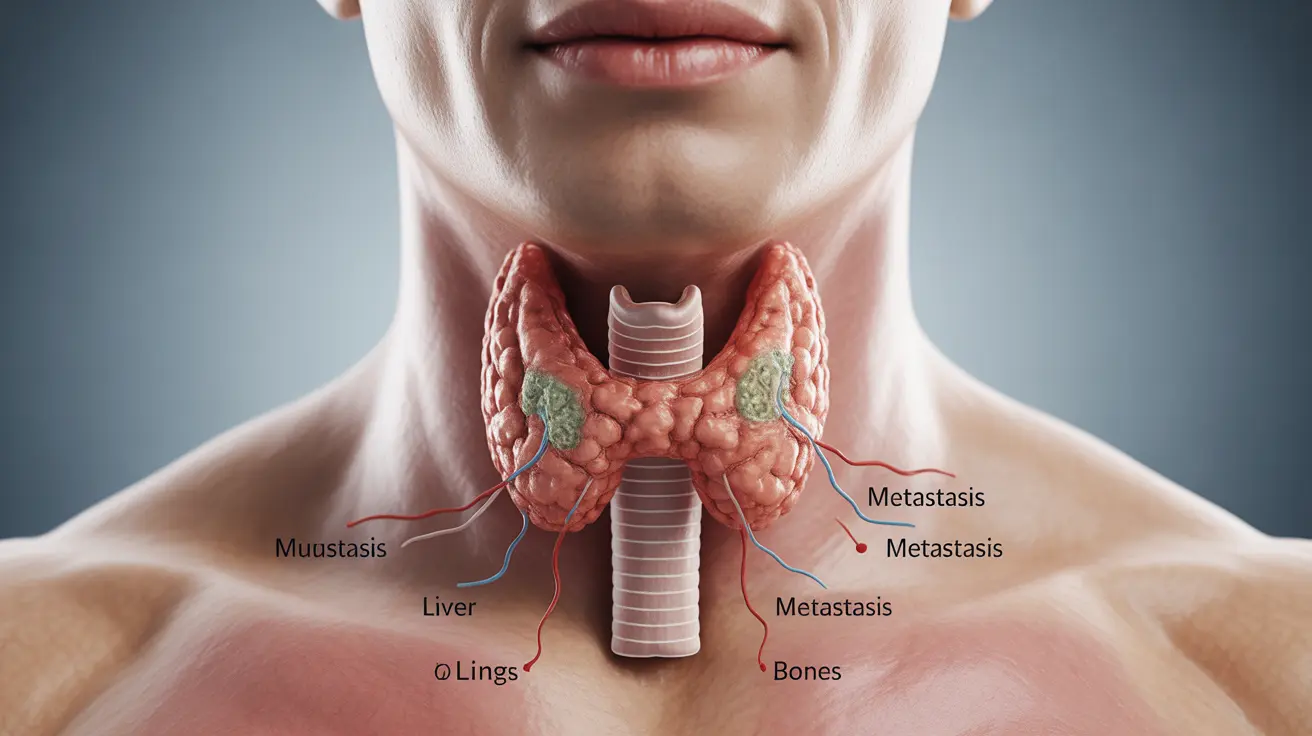Stage 4 medullary thyroid cancer represents an advanced form of this rare thyroid malignancy that requires comprehensive understanding and specialized medical attention. This advanced stage presents unique challenges for both patients and healthcare providers, making it crucial to explore treatment options and understand factors affecting life expectancy.
While receiving a stage 4 diagnosis can be overwhelming, modern medical advances have expanded treatment possibilities and improved outcomes for many patients. Understanding the condition and available interventions can help patients and their families make informed decisions about their care journey.
Understanding Stage 4 Medullary Thyroid Cancer
Medullary thyroid cancer (MTC) differs from other thyroid cancers because it develops in the C cells of the thyroid gland rather than in hormone-producing thyroid cells. Stage 4 indicates that the cancer has spread beyond the thyroid to distant parts of the body, such as the lungs, liver, or bones.
Common Symptoms and Warning Signs
At stage 4, medullary thyroid cancer typically presents with more pronounced symptoms than earlier stages. These may include:
- Noticeable neck mass or swelling
- Difficulty swallowing or breathing
- Persistent hoarseness
- Bone pain (if cancer has spread to bones)
- Unexplained weight loss
- Chronic diarrhea
- Fatigue and weakness
Treatment Approaches for Advanced MTC
Treatment for stage 4 medullary thyroid cancer typically involves a multi-modal approach, combining various therapeutic strategies:
Surgical Intervention
Even in stage 4, surgery may be recommended to remove the thyroid gland and affected lymph nodes, helping to reduce tumor burden and manage symptoms.
Targeted Therapy
Modern targeted medications like cabozantinib and vandetanib have shown promising results in controlling advanced MTC by targeting specific molecular pathways involved in cancer growth.
Radiation Therapy
External beam radiation therapy may be used to manage symptoms and control cancer spread, particularly in cases where surgery isn't possible.
Factors Affecting Prognosis and Life Expectancy
Several key factors influence the outlook for patients with stage 4 medullary thyroid cancer:
- Age at diagnosis
- Overall health status
- Genetic factors (sporadic vs. inherited MTC)
- Response to treatment
- Extent of metastatic spread
- Timing of diagnosis and treatment initiation
Survival Rates and Quality of Life
While stage 4 medullary thyroid cancer presents significant challenges, survival rates can vary considerably among individuals. The 5-year survival rate for stage 4 MTC differs from other thyroid cancers, generally being lower than papillary or follicular thyroid cancer but potentially higher than anaplastic thyroid cancer.
Frequently Asked Questions
What are the typical symptoms of stage 4 medullary thyroid cancer?
Stage 4 medullary thyroid cancer typically presents with symptoms such as neck masses, difficulty swallowing, hoarseness, bone pain (if metastasized), and chronic diarrhea. Systemic symptoms like fatigue and weight loss may also occur.
How is stage 4 medullary thyroid cancer treated, and what are the most effective treatment options?
Treatment typically combines surgery (when possible), targeted therapy medications, and radiation therapy. Targeted drugs like cabozantinib and vandetanib have shown significant effectiveness in managing advanced MTC.
What factors affect the prognosis of stage 4 medullary thyroid cancer?
Prognosis is influenced by age, overall health, genetic factors, response to treatment, extent of metastasis, and timing of diagnosis. Early intervention and appropriate treatment selection can significantly impact outcomes.
How does the survival rate for stage 4 medullary thyroid cancer compare to other types of thyroid cancer?
Stage 4 MTC generally has lower survival rates compared to papillary and follicular thyroid cancers but better outcomes than anaplastic thyroid cancer. Individual outcomes can vary significantly based on personal factors and treatment response.
What are the potential benefits and risks of targeted therapy for advanced medullary thyroid cancer?
Targeted therapy can effectively slow cancer progression and improve symptoms. However, potential risks include side effects like diarrhea, high blood pressure, fatigue, and skin problems. Regular monitoring and dose adjustments may be necessary to manage these effects.




